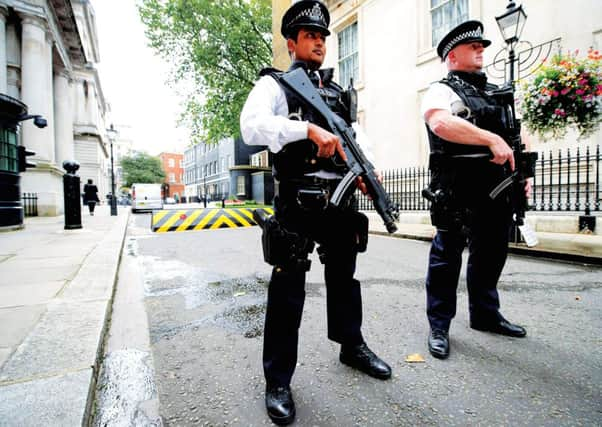Cameron, Clegg talks over UK terror response


Cameron is due to make a statement tomorrow in the House of Commons where he will announce steps to close “gaps in our armoury”, including new legislation to make it easier to take people’s passports away to prevent them from travelling to Iraq and Syria.
The proposals come in response to the raising of the terror threat level in the UK, with experts warning that an attack was “highly likely.”
Advertisement
Hide AdAdvertisement
Hide AdA Lib Dem source said Clegg and the Prime Minister were in “constant communication” on the issue and “we will consider very carefully any new proposals that are put to us.”
Scottish ministers have been fully briefed on the terrorist threat and a Scottish Government spokeswoman said it would continue to work closely with the Home Office and the police. National security and special terrorism measures come under Westminster control and the Scottish Government has yet to see the detail of Cameron’s proposals. However, the Scottish Government expects to be consulted if there are any implications for devolved areas such as policing and criminal justice.
Cameron, who is meeting European leaders in Brussels where he will push for co-ordinated EU action to track jihadis, has insisted there will not be a “knee jerk response” to the threat posed by British extremists returning from the Middle East, but more needed to be done.
“We need to do more to stop people travelling, to stop those who do go from returning, and to deal decisively with those who are already here,” he said.
“This will include further steps to stop people travelling, with new legislation that will make it easier to take people’s passports away.”
The Lib Dem source said: “We wanted to avoid any knee jerk responses and the Prime Minister made very clear that he agrees with that.” The source said “any new proposals would be discussed carefully, based on the evidence and with regard to the liberty of British citizens”.
Speculation is mounting that the government could bow to pressure for terrorism prevention and investigation measures (Tpims) to be beefed up. There have been calls for powers to impose “internal exile” on suspects, a key part of the old control orders regime, to be restored.
Labour leader Ed Miliband suggested the government should “revisit” the decision to scrap control orders in favour of Tpims. He said the government should take action to stop young Britons being drawn to extremist ideology, with tougher measures to prevent would-be jihadis travelling to join IS fighters in Iraq and Syria.
Advertisement
Hide AdAdvertisement
Hide AdMiliband also suggested mandatory deradicalisation for those involved on the fringes with IS and called for ministers to revisit the decision to scrap the control orders regime for terror suspects.
Writing in the Independent, Miliband stressed the need for a “multilateral alliance” combining political, diplomatic and humanitarian action to counter the “perverted mission” of IS in the Middle East.
In the UK, he said, “we should act with clarity and determination” to tackle the threat from extremists. “Such action must include an overhaul of the Home Office Prevent programme to equip communities with the tools to stop young people being sucked into extremist ideology.
“We should also do more to prevent potential fighters from travelling to the region, and promote an effective, mandatory programme of deradicalisation for anyone who is drawn into the fringes of extremism in Syria and Iraq.”
He highlighted concerns raised by David Anderson, the independent reviewer of counter-terrorism legislation, about the effectiveness of Tpims. Miliband said: “For the most serious and high-risk cases, as the independent reviewer on terrorism has recommended, the Government should strengthen existing powers, including revisiting the case for control orders.”
The threat level was raised from substantial to severe by the Joint Terrorism Analysis Centre (JTAC) due to fears about British jihadists returning from Iraq and Syria. The change means a terrorist attack is considered “highly likely”, although Home Secretary Theresa May stressed there was no specific intelligence.
“The increase in the threat level is related to developments in Syria and Iraq where terrorist groups are planning attacks against the West,” May said. “Some of those plots are likely to involve foreign fighters who have travelled there from the UK and Europe to take part in those conflicts.”
In Brussels, Cameron will launch a fresh push to allow police across the EU to share passenger records. National leaders have signed off on the move – but it has stalled in the European Parliament over civil liberties concerns.